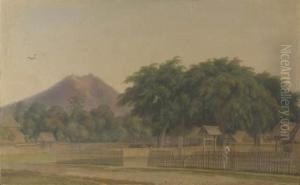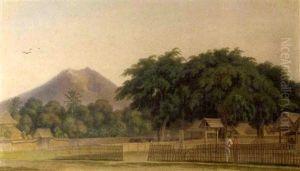Antoine A.J. Payen Paintings
Antoine A.J. Payen, born on May 6, 1795, in Brussels, was a pioneering Belgian chemist and industrialist whose work laid foundational stones in the fields of industrial chemistry and materials science. Although Payen's name might not be immediately recognizable to many outside the realms of chemistry and industrial history, his contributions have had a lasting impact, particularly in the development of processes related to the production and utilization of cellulose and the invention of the first wood pulp process for making paper.
Payen's early life was marked by his keen interest in the sciences, a passion that led him to study chemistry, among other subjects. His academic pursuits were complemented by a strong inclination towards applied science, particularly in the industrial sector, which was burgeoning during his lifetime thanks to the Industrial Revolution. This blend of interests and skills positioned Payen uniquely at the intersection of scientific discovery and industrial application, allowing him to make significant advancements in his field.
One of Payen's most notable contributions was his work on cellulose, a complex carbohydrate that is a key structural component of plant cells. In 1838, he isolated cellulose for the first time, a breakthrough that not only provided fundamental insights into plant biology but also opened the door to a range of practical applications, most notably in the production of paper. Prior to Payen's work, paper was made primarily from rags and linen, materials that were becoming increasingly scarce and expensive. Payen's discovery of a method to produce paper from wood pulp significantly reduced the cost of paper production and facilitated the widespread availability of books, newspapers, and other printed materials, thereby contributing to the spread of literacy and knowledge.
Moreover, Payen's contributions extended beyond cellulose. He was also a pioneer in the study of enzymes, discovering diastase, the first enzyme to be isolated, in 1833. This discovery was pivotal in the development of biochemistry and has had profound implications for various industries, including brewing and food processing.
Throughout his career, Payen was recognized for his contributions to science and industry. He was honored with various awards and was a member of several prestigious scientific societies. Despite the significance of his work, Payen remained relatively modest and focused on his research until his death on March 13, 1871. Today, Antoine A.J. Payen is remembered as a visionary scientist whose work bridged the gap between theoretical chemistry and practical industrial applications, laying the groundwork for numerous technological advances that continue to benefit society.






